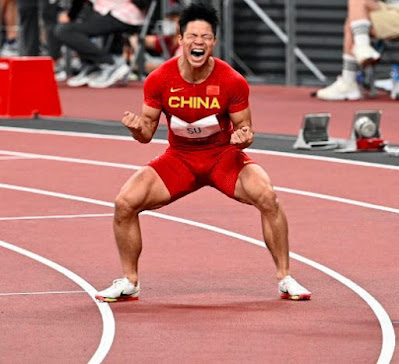Queenie Ting became the first Malaysian to throw over 50m in women's discus throw
>> November 14, 2021
A new national record was set during the Malaysian Track & Field Trials on Sunday (14 November).
Queenie Ting Kung Ni has thrown 50.67m to break her own national record of 48.56m she set during the Malaysian Grand Prix in April this year.
It was an improvement of more than two metres.
The 24-year-old achieved it twice, first with 49.02m from the second throw, before throwing the >50m mark in the 3rd throw.
She became the first Malaysian to throw over 50m for women's discus throw.
SELECTED RESULTS:
MEN
100m (13)
Race A
1. Mohammad Raimi Mustaffa Kamal 10.5h
Race A
1. Mohammad Raimi Mustaffa Kamal 10.5h
Race B
1. Jonathan Nyepa 10.4h
2. Muhammad Zulfiqar Ismail 10.5h
3. Luqmanul Hakim Khairul Akmal 10.6h
1. Jonathan Nyepa 10.4h
2. Muhammad Zulfiqar Ismail 10.5h
3. Luqmanul Hakim Khairul Akmal 10.6h
200m (14)
1. Luqmanul Hakim Khairul Akmal 21.6h
2. Muhammad Ilham Suhaimi 21.8h
3. Mohammad Raimi Mustaffa Kamal 21.9h
4. Muhammad Zulfiqar Ismail 22.0h
1. Luqmanul Hakim Khairul Akmal 21.6h
2. Muhammad Ilham Suhaimi 21.8h
3. Mohammad Raimi Mustaffa Kamal 21.9h
4. Muhammad Zulfiqar Ismail 22.0h
400m (13)
1. Muhammad Ilham Suhaimi 48.4h
2. Ruslem Zikry Putra Roseli 48.7h
3. Muhammad Saiful Safwan Saifuddin 48.8h
1. Muhammad Ilham Suhaimi 48.4h
2. Ruslem Zikry Putra Roseli 48.7h
3. Muhammad Saiful Safwan Saifuddin 48.8h
1500m (13)
1. Muhammad Amirul Arif 4:01.1h
1. Ahmad Luth Hamizan 4:03.8h
1. Muhammad Amirul Arif 4:01.1h
1. Ahmad Luth Hamizan 4:03.8h
3000m Sc (13)
1. Ahmad Luth Hamizan 9:51.9h
1. Ahmad Luth Hamizan 9:51.9h
400mh (14)
1. Ruslem Zikry Putra Roseli 52.9
1. Ruslem Zikry Putra Roseli 52.9
High Jump (14)
1. Lee Hup Wei 2.10
1. Lee Hup Wei 2.10
Pole Vault (13)
1. Iskandar Alwi 5.00
1. Iskandar Alwi 5.00
Long Jump (14)
1. Andre Anura 7.10
1. Andre Anura 7.10
Triple Jump (13)
1. Brendon Ting Li King 15.08
2. Muhammad Nazri Mustafa 14.76
1. Brendon Ting Li King 15.08
2. Muhammad Nazri Mustafa 14.76
Shot Put (13)
1. Farm Loong Deng 15.75
2. Kong Chin Poh 15.38
3. Jonah Chang Rigan 14.93
1. Farm Loong Deng 15.75
2. Kong Chin Poh 15.38
3. Jonah Chang Rigan 14.93
Discus Throw (13)
1. Kamal Farhan A. Rahman 47.22
2. Jonah Chang Rigan 43.32
1. Kamal Farhan A. Rahman 47.22
2. Jonah Chang Rigan 43.32
3. Faris Hazim Jamaludin 42.60
WOMEN
100m (13)
1. Fatin Ilyana Mat Nayan 12.1h
2. Nur Sarah Aadi 12.2h
3. Siti Zubaidah Adabi 12.4h
1. Fatin Ilyana Mat Nayan 12.1h
2. Nur Sarah Aadi 12.2h
3. Siti Zubaidah Adabi 12.4h
200m (14)
1. Komalam Shally Selveratnam 25.2h
2. Nurul Asma Faizah Mazlan 25.3h
400m (13)
1. Nurul Asma Faizah Mazlan 57.5h
800m (14)
1. Savinder Kaur 4:14.4h
High Jump (13)
1. Norliyana Kamaruddin 1.70
2. Ngu Jia Xin 1.70
3. Yap Sean Yee 1.70
1. Norliyana Kamaruddin 1.70
2. Ngu Jia Xin 1.70
3. Yap Sean Yee 1.70
Long Jump (13)
1. Nur Asyikin Abas 5.78
2. Kirthana Ramsamy 5.65
3. Nur Sahar Adi 5.62
1. Nur Asyikin Abas 5.78
2. Kirthana Ramsamy 5.65
3. Nur Sahar Adi 5.62
Discus Throw (14)
1. Queenie Ting Kung Ni 50.67 (NR)
2. Connie Choo Kang Ni 45.25
3. Yap Jen Tzan 40.60
1. Queenie Ting Kung Ni 50.67 (NR)
2. Connie Choo Kang Ni 45.25
3. Yap Jen Tzan 40.60
Javelin Throw (13)
1. Nur Ayna Nuha Maton 38.86
2. Pavithra Devi Jayaindran 38.28
1. Nur Ayna Nuha Maton 38.86
2. Pavithra Devi Jayaindran 38.28














